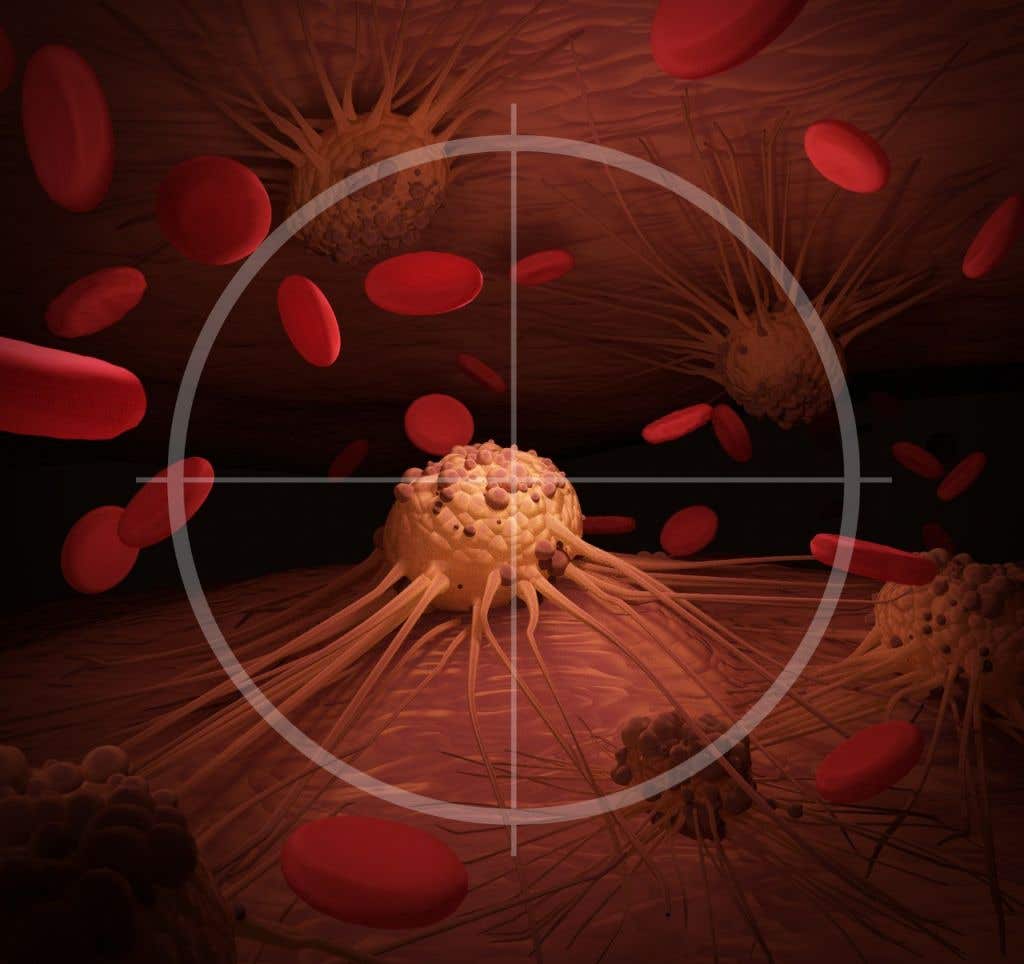Gamechanging treatment targets and destroys prostate cancer
For the first time, researchers have discovered that prostate cancer can be killed by targeting a single enzyme, called PI5P4Kα.

[Sept. 12, 2023: Miles Martin, Sanford Burnham Prebys]
For the first time, researchers have discovered that prostate cancer can be killed by targeting a single enzyme, called PI5P4Kα. (CREDIT: Creative Commons)
For the first time, researchers have discovered that prostate cancer can be killed by targeting a single enzyme, called PI5P4Kα. The findings, published recently in Science Advances, could help address the growing threat of treatment resistance in prostate cancer and could also lead to improved treatments for other cancers, such as those affecting the breast, skin, and pancreas.
“This is the first time this enzyme has been implicated in prostate cancer, and we expect that it will prove relevant to other cancers as well,” says co-senior author Brooke Emerling, Ph.D., an associate professor at Sanford Burnham Prebys. “An important element of improving precision medicine is using as many tools as possible to treat cancer while mitigating the risk of resistance.”
Many cases of prostate cancer can be treated through treatments that lower testosterone and other male sex hormones, but about 10–20% of prostate cancer cases resist treatment within five years. This treatment-resistant prostate cancer can then spread to the rest of the body, where it becomes deadly.
“Understanding how prostate cancer develops resistance is critical for discovering new therapeutic strategies to delay or reverse the progression of prostate cancer,” says Emerling.
Related Stories
The prostate gland requires male sex hormones, known as androgens, to grow. Prostate cancer hijacks the androgen signaling machinery of the prostate in order to grow rapidly, which is why treatments that disrupt these pathways are effective.
“What’s remarkable is that we’ve found an enzyme that can be targeted against prostate cancer even in cases where treatments that lower hormones are ineffective or where resistance has developed,” says Emerling. “This could give us a whole new weapon against prostate cancer and other cancers that rely on this enzyme.”
The study was prompted by an observation made by Emerling’s colleagues at the University of Bern, led by co-senior author Mark A. Rubin. They noticed that patients with treatment-resistant prostate cancer had high levels of PI5P4Kα, suggesting that this protein played a role in the cancer’s ability to resist treatment and grow. Emerling’s team was then able to show—using multiple prostate cancer model systems—that inhibiting this enzyme could kill treatment-resistant prostate cancer.
Associate Professor Brooke Emerling (CREDIT: Sanford Burnham Prebys)
“It was that initial observation from the patient data that really got us excited,” adds Emerling.
PI5P4Kα is part of a group of enzymes called PI5P4Ks that are involved in the metabolism of lipids, a type of molecule that includes fats, hormones, and many vitamins. While other areas of cancer metabolism have been extensively researched for decades, lipid metabolism has only recently emerged as a promising therapeutic avenue for cancer.
“Treatments that target lipid metabolism could be an unexplored treasure trove, and it’s something researchers are very interested in right now,” says Emerling. “We’re working to develop drugs to target this enzyme, and there are several companies out there developing their own drugs as well.”
Because of this interest, Emerling and her colleagues are optimistic about the future of this treatment approach.
She says, “There’s no drug yet, but I have high hopes that in the near future, we’ll have something in clinical trials. That would be amazing.”
Symptoms of prostate cancer:
According to the Mayo Clinic, prostate cancer may cause no signs or symptoms in its early stages.
Prostate cancer that's more advanced may cause signs and symptoms such as:
Trouble urinating
Decreased force in the stream of urine
Blood in the urine
Blood in the semen
Bone pain
Losing weight without trying
Erectile dysfunction
Causes of prostate cancer:
It's not clear what causes prostate cancer.
The prostate gland is located just below the bladder in men and surrounds the top portion of the tube that drains urine from the bladder (urethra). (CREDIT: Getty Images)
Doctors know that prostate cancer begins when cells in the prostate develop changes in their DNA. A cell's DNA contains the instructions that tell a cell what to do. The changes tell the cells to grow and divide more rapidly than normal cells do. The abnormal cells continue living, when other cells would die.
Prostate gland: The prostate gland is located just below the bladder in men and surrounds the top portion of the tube that drains urine from the bladder (urethra). The prostate's primary function is to produce the fluid that nourishes and transports sperm (seminal fluid).
The accumulating abnormal cells form a tumor that can grow to invade nearby tissue. In time, some abnormal cells can break away and spread (metastasize) to other parts of the body.
Risk factors for prostate cancer:
Factors that can increase your risk of prostate cancer include:
Older age. Your risk of prostate cancer increases as you age. It's most common after age 50.
Race. For reasons not yet determined, Black people have a greater risk of prostate cancer than do people of other races. In Black people, prostate cancer is also more likely to be aggressive or advanced.
Family history. If a blood relative, such as a parent, sibling or child, has been diagnosed with prostate cancer, your risk may be increased. Also, if you have a family history of genes that increase the risk of breast cancer (BRCA1 or BRCA2) or a very strong family history of breast cancer, your risk of prostate cancer may be higher.
Obesity. People who are obese may have a higher risk of prostate cancer compared with people considered to have a healthy weight, though studies have had mixed results. In obese people, the cancer is more likely to be more aggressive and more likely to return after initial treatment.
Prevention of prostate cancer:
The Mayo Clinic believes that people can reduce their risk of prostate cancer if they:
Choose a healthy diet full of fruits and vegetables. Eat a variety of fruits, vegetables and whole grains. Fruits and vegetables contain many vitamins and nutrients that can contribute to your health.
Whether you can prevent prostate cancer through diet has yet to be conclusively proved. But eating a healthy diet with a variety of fruits and vegetables can improve your overall health.
Choose healthy foods over supplements. No studies have shown that supplements play a role in reducing your risk of prostate cancer. Instead, choose foods that are rich in vitamins and minerals so that you can maintain healthy levels of vitamins in your body.
Exercise most days of the week. Exercise improves your overall health, helps you maintain your weight and improves your mood. Try to exercise most days of the week. If you're new to exercise, start slow and work your way up to more exercise time each day.
Maintain a healthy weight. If your current weight is healthy, work to maintain it by choosing a healthy diet and exercising most days of the week. If you need to lose weight, add more exercise and reduce the number of calories you eat each day. Ask your doctor for help creating a plan for healthy weight loss.
Talk to your doctor about increased risk of prostate cancer. If you have a very high risk of prostate cancer, you and your doctor may consider medications or other treatments to reduce the risk. Some studies suggest that taking 5-alpha reductase inhibitors, including finasteride (Propecia, Proscar) and dutasteride (Avodart), may reduce the overall risk of developing prostate cancer. These drugs are used to control prostate gland enlargement and hair loss.
However, some evidence indicates that people taking these medications may have an increased risk of getting a more serious form of prostate cancer (high-grade prostate cancer). If you're concerned about your risk of developing prostate cancer, talk with your doctor.
Note: Materials provided above by Sanford Burnham Prebys. Content may be edited for style and length.
Like these kind of feel good stories? Get the Brighter Side of News' newsletter.
Joseph Shavit
Head Science News Writer | Communicating Innovation & Discovery
Based in Los Angeles, Joseph Shavit is an accomplished science journalist, head science news writer and co-founder at The Brighter Side of News, where he translates cutting-edge discoveries into compelling stories for a broad audience. With a strong background spanning science, business, product management, media leadership, and entrepreneurship, Joseph brings a unique perspective to science communication. His expertise allows him to uncover the intersection of technological advancements and market potential, shedding light on how groundbreaking research evolves into transformative products and industries.



